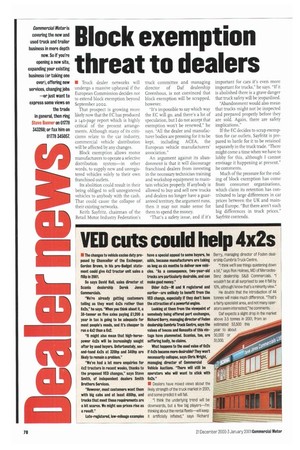Block exemption threat to dealers
Page 80

If you've noticed an error in this article please click here to report it so we can fix it.
• Truck dealer networks will undergo a massive upheaval if the European Commission decides not to extend block exemption beyond September 2002.
That prospect is growing more likely now that the EC has produced a 14o-page report which is highly critical of the present arrangements. Although many of its criticisms relate to the car industry, commercial vehicle distribution will be affected by any changes.
Block exemption allows motor manufacturers to operate a selective distribution system—in other words, to supply new and unregistered vehicles solely to their own franchised outlets.
Its abolition could result in their being obliged to sell unregistered vehicles to anybody with the cash. That could cause the collapse of their existing networks.
Keith Sayfritz, chairman of the Retail Motor Industry Federation's truck committee and managing director of Daf dealership Creenhous, is not convinced that block exemption will be scrapped, however.
"It's impossible to say which way the EC will go, and there's a lot of speculation, but I do not accept that exemption won't be renewed," he says. "All the dealer and manufacturer bodies are pressing for it to be kept, including AC EA, the European vehicle manufacturers' association."
An argument against its abandonment is that it will discourage franchised dealers from investing in the necessary technician training and workshop equipment to maintain vehicles properly. lf anybody is allowed to buy and sell new trucks and dealers no longer have a guaranteed territory, the argument runs, then it may not make sense for them to spend the money.
"That's a safety issue, and if its important for cars it's even more important for trucks," he says. "If it is abolished there is a grave danger that truck safety will be ieopardised.
"Abandonment would also mean that trucks might not be inspected and prepared properly before they are sold. Again, there are safety implications."
If the EC decides to scrap exemption for car outlets, Sayfritz is prepared to battle for it to be retained separately in the truck trade. "There might come a time when we have to lobby for this, although I cannot envisage it happening at present," he comments.
Much of the pressure for the ending of block exemption has come from consumer organisations, which claim its retention has contributed to large differences in car prices between the UK and mainland Europe. "But there aren't such big differences in truck prices," Sayfritz contends.








































































































































